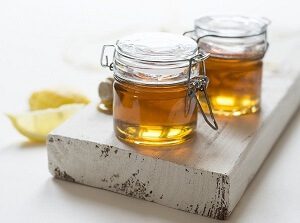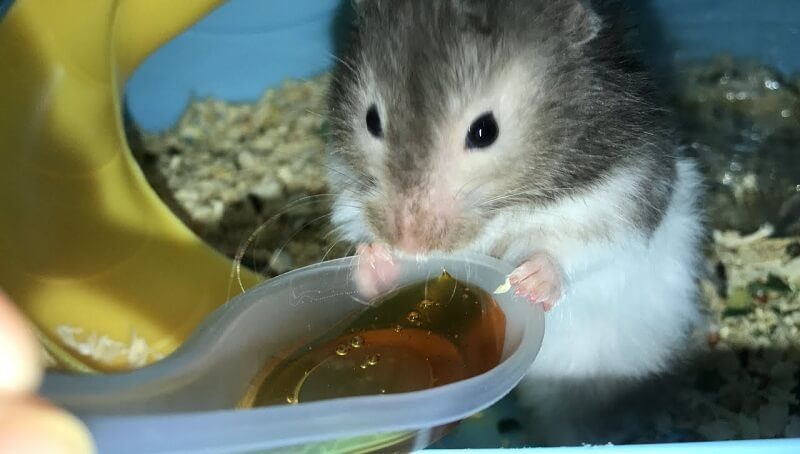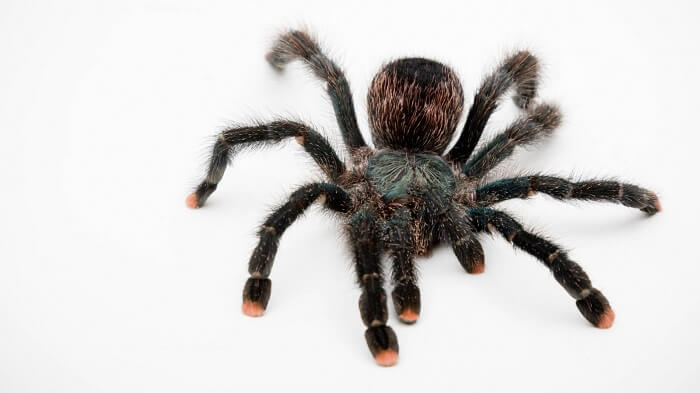Honey is not only tasty but also a true source of health. People have used honey as a sweetener, but also for its antibacterial and antifungal properties since ancient times. The benefits of honey are due to its content of vitamins, enzymes, amino acids, and minerals like calcium, iron, sodium chloride, magnesium, phosphate, and potassium.
Honey is a tasty food, appreciated by both children and adults, but also a healthy sweetener. It has been discovered, over time, that honey has therapeutic properties for various health problems. It treats and prevents the most diverse and serious conditions and it is believed to also be a miraculous treatment with honey against cancer.
Does that mean we can share it with our pets? And can hamsters eat this natural sweetener?
Can your hamster eat honey?
To keep it short and sweet, yes, hamsters can eat honey, but only in very small quantities.
It is always best to think about what an animal would eat if it were in the wild, especially one that has been domesticated as hamsters have.
Hamsters don’t eat a lot of sugar in the wild, because they get natural sugars from the fruits they feed on, and even these are few. Honey is not a typical food for them, and hamsters are particularly sensitive to sugary substances.
You might also like my articles on whether hamsters can eat oranges, bread, and cockroaches.
If you decide to offer honey to your hamster, be sure to keep an eye on them after giving them just a tiny amount. Some hamsters are too sensitive for something so sweet. It might cause gastrointestinal issues, including vomiting or diarrhea.
Nutritional value of honey
Honey also has positive aspects, even in the tiny amounts you fed to your hamster.
Honey has a higher nutritional value than almost any other known sweetener, either natural or synthetic. Bees produce it using nectar that they take from flowers. They bring it back to hives, and worker bees help store and transform the substance throughout the season.
Honey is meant to be food for bees, so they keep it to have plenty to feed on throughout the seasons without flowers, such as winter.
Because honey comes from so many different plants, it has a fairly large range of vitamins. Your hamster can benefit from vitamins B2 and B3, as well as iron.
Benefits
- Antioxidants – help your hamster fights some problems that come with aging
- Antiviral – even in small amounts offers protection against colds.
- Potassium – offers benefits for the well-functioning of the hamster’s body.
- Calcium – perfect for the hamster’s bones and teeth.
- Magnesium – beneficial in lowering blood pressure.
The risks of offering honey to your hamster
 Feeding your hamster honey also has many health risks. One tablespoon of honey contains 17 grams of sugar and 64 calories. Hamsters are quite sensitive to sugar and can suffer from obesity and heart problems if they are fed too much of it.
Feeding your hamster honey also has many health risks. One tablespoon of honey contains 17 grams of sugar and 64 calories. Hamsters are quite sensitive to sugar and can suffer from obesity and heart problems if they are fed too much of it.
Beyond the small but useful amounts of vitamins and iron, honey also contains sodium and phosphorus. They are often useful in human diets, but not in the case of hamsters. They are only present in small amounts, however, so if you feed your hamster only small portions of honey, it will not be enough to cause problems.
Sugar from honey and any other sweet snack can damage their teeth over time.
Honey is also sticky enough that, by itself, it can present a choking hazard to your hamster by getting stuck in its mouth or throat. Avoid this by diluting it with water before serving it.
In addition, sugar, molasses, honey, and some others can cause a hamster’s cheek pouch to stick. Only the rodents’ front teeth grow back, not molars, and the sweets can cause tooth decay.
Risks
- Diabetes – can be caused when you give your hamster too much sugar.
- Obesity –because honey is rich in sugars so a hamster can easily gain weight, leading to other health issues.
- Nutritional Issues –when your hamster gets too much honey, it won’t eat its usual diet. Sometimes it can start refusing its normal food, leading to imbalanced nutrition.
- Other issues – they can get cavities from the honey sticking to their pouches.
Final words!
Honey is not a toxic substance for hamsters, but it can only be served in very tiny portions, and not too often. It is better to give them fruit if you want to give them something sweet to eat.
Their cheek pouches will also be happy to receive a small piece of dried fruit a week, such as a raisin or a piece of dried apple, or a pear. It contains more beneficial natural vitamins that contribute to a healthy diet in the hamster. Fruit pieces are therefore the best choice if you want to do something good for your hamster from time to time.




